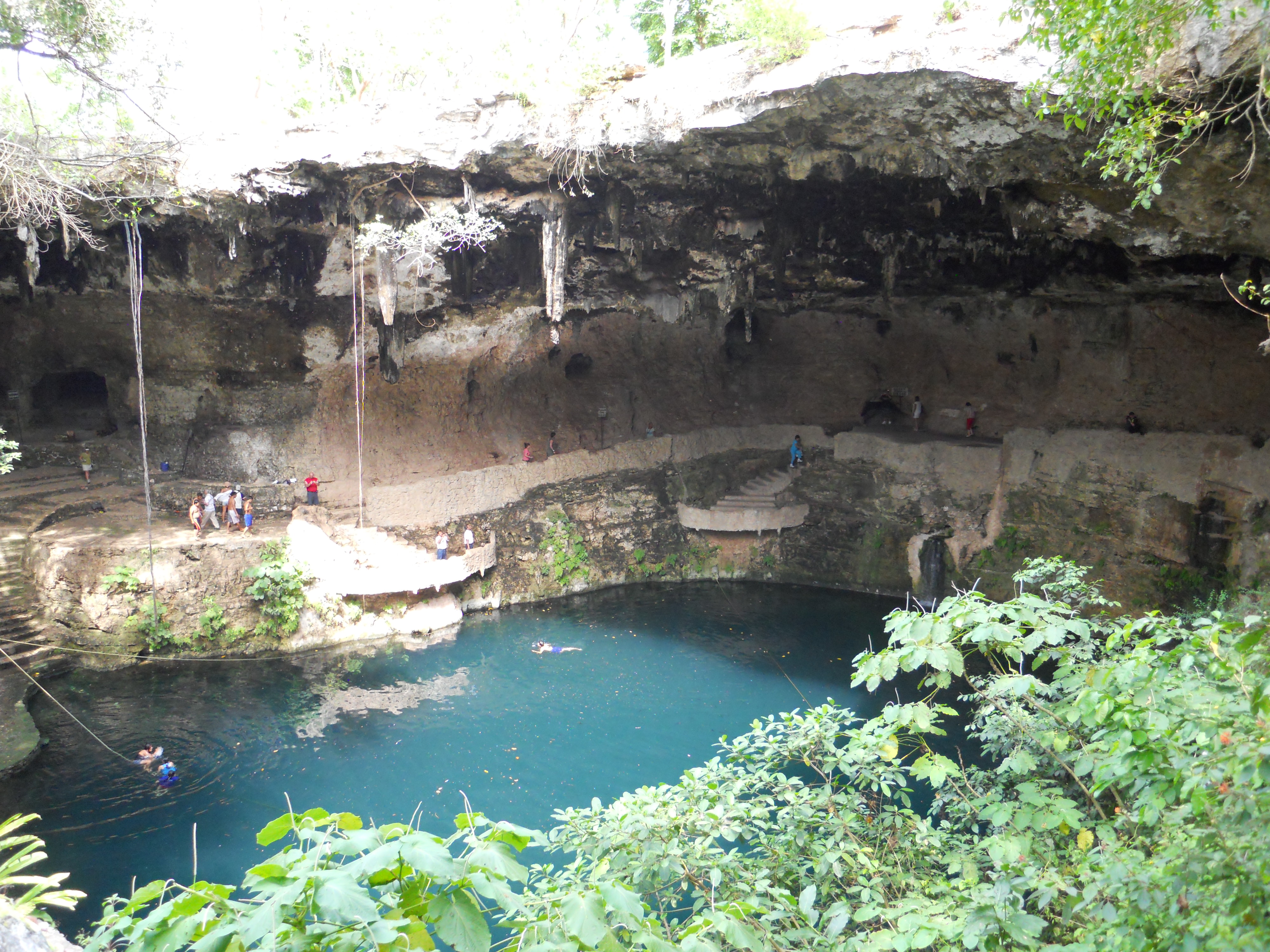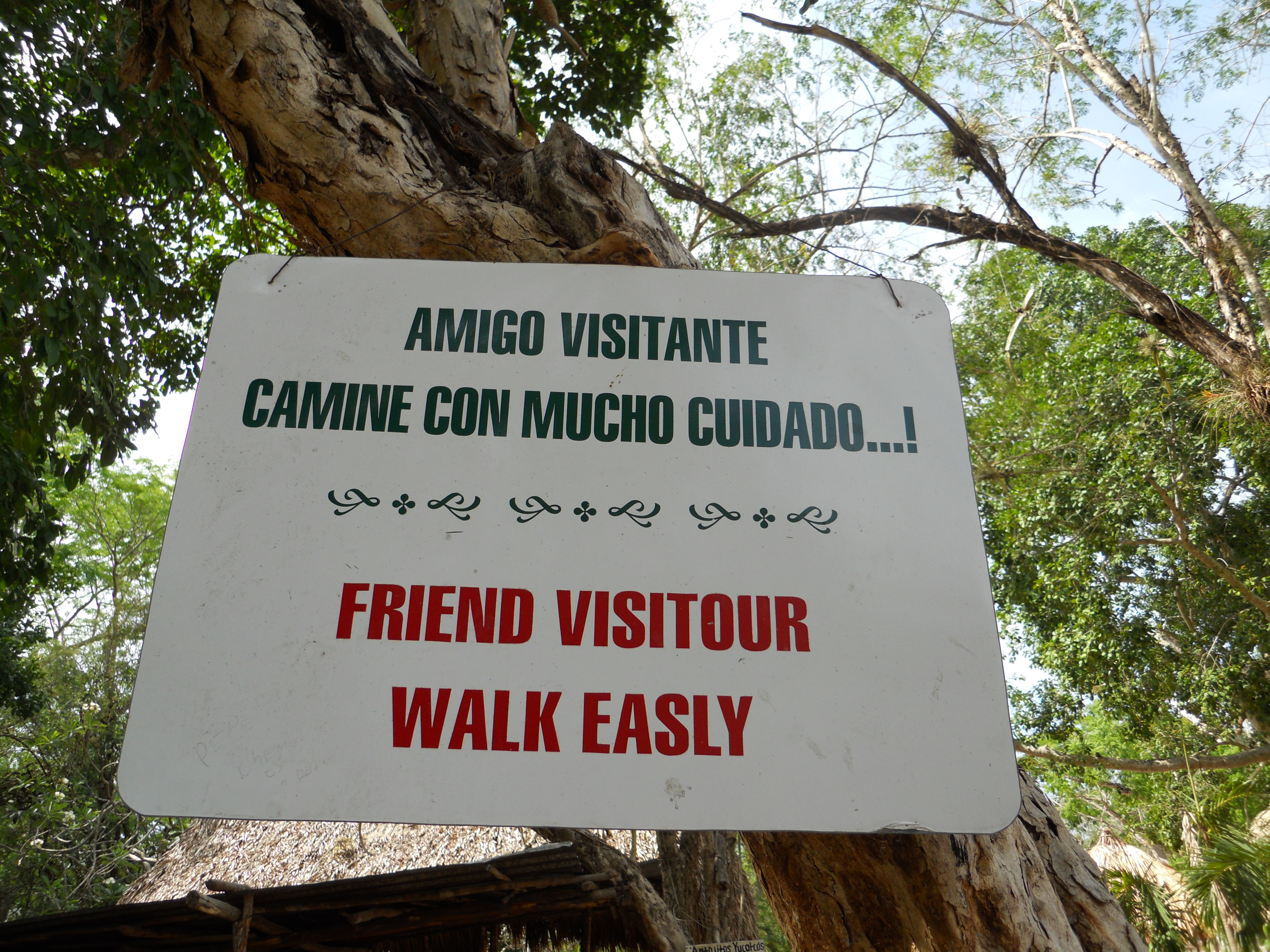Hello Language Nerd,
I’m on my way to Mexico City in a few days, and I don’t know a word of Spanish. Can you help?
Peter P.
***
Dear Peter,
Spanish is not one of the languages the Language Nerd has studied, but you’re in luck — I’m wandering through Mexico at the moment myself, and am prepared to do on-the-ground research to help you (and me) out. (People who actually know Spanish: please send corrections! Also other handy phrases, that would be swell)
Let’s start with the basics. Hola. Adiós. Sí. No. Por favor. These probably don’t even need translation, but hey, why not? “Hello.” “Good-bye.” “Yes.” “No.” “Please.”
Gracias. “Thank you.” An important phrase.
No, gracias. “No thank you.” Even more important, because you need this to remove knickknack-peddlars from your path.
De nada. “It’s nothing” (used like “you’re welcome”). On the off chance that someone starts thanking you.
Perdón. “Sorry.” For when you drop your knickknacks on other passers-by.
¿Donde esta el cenote? “Where is the cenote?” That’s pronounced seh-no-tay. You could use Donde esta to ask where less interesting things are, like el baño (“the bathroom”) or una chocolatería (mmmm), but you should probably go find a cenote too. They are enormous sinkholes full of water, giant, beautiful pools, often found inside caverns. They are mostly in the Yucatán, so a bit out of your way, but trust me — worth it.
¿Es seguro saitar desde estas rocas? “Is it safe to dive from these rocks?” For use in the cenote.

Cenote Zaci, in Valladolid. 90 feet deep… in the shallow end. (Photo credit: me! And yes, I totally dove off those rocks. Well, maybe less “dove” and more “jumped and flailed.”)
No entiendo. “I don’t understand.” Also No entiendo nada, “I don’t understand anything.” Actually, it’s literally “I don’t understand nothing,” because Spanish is one of the many sensible languages where two negatives reinforce each other, instead of somehow cancelling each other out.
Disculpe. “Excuse me.” As in, ¿Discúlpe, habla inglés? (“Excuse me, do you speak English?”)
¿Cuánto cuesta? “How much does it cost?” You can put whatever object you want to buy after, like ¿Cuánto cuesta una hamaca? (“a hammock”) or ¿Cuánto cuesta una iguana? (Don’t really buy an iguana, though. What would you even do with it?)
Es muy caro. “It’s very expensive.” Say this even if it is not very expensive. That’s all my advice: now you’re on your own, haggling-wise.
¡Estaba buenísimo! “That was delicious!” I got this one out of a guidebook, and was inititally skeptical because it looked too Italian-y to me, but turns out waiters and chefs really do love to hear this.
La cuenta, por favor. “The check, please.” This one is important because in Mexican eateries people understand the joy of savoring one’s meal, and also of quietly digesting and/or chatting with one’s friends after one has finished the meal, and they will never ever ever bring you the check if you don’t ask. They will never even ask you if you want the check. They will leave you in peace indefinitely. It is a beautiful thing.
Hey, that makes this the second in a series, after Useful Korean Phrases! Man, now I really wish I’d come up with a snappier title the first time around. Ah well.
Yours,
The Language Nerd
Update: Thanks to Victor a vocab fix — saitar, not bucear, is for jumping in the water.
Got a language question? Ask the Language Nerd! asktheleagueofnerds@gmail.com
Or: Twitter @AskTheLeague / facebook.com/asktheleagueofnerds
References! I picked up a lot of this my very own self, and a new hostel buddy of mine checked the grammar of the more complicated bits. I got ¡Estaba buenísimo! out of Lonely Planet’s Latin American Spanish Phrasebook and Dictionary, which I also used to check my spelling. It’s a good, palm-sized book, so I recommend it if the phrases above somehow fail to cover every situation you encounter.


Reblogged this on barbielicious2233 and commented:
Hi,I can help you. hola=hi, como esta=how are you, como te llamo=what is your name
Thanks!
[…] Useful Spanish Phrases (theleagueofnerds.wordpress.com) […]
[…] in the Useful Phrases series! […]